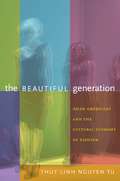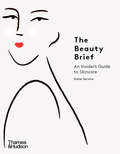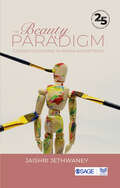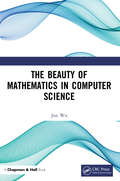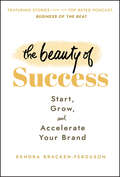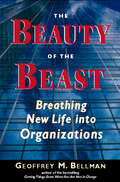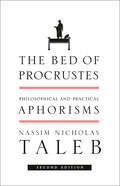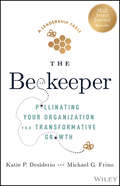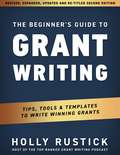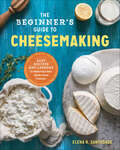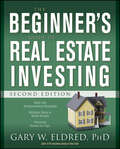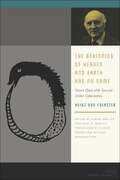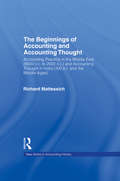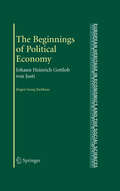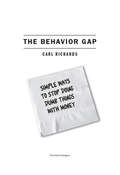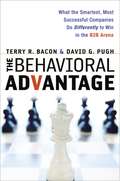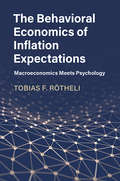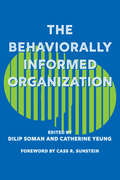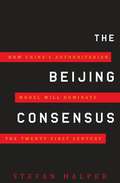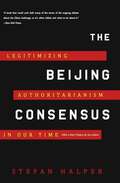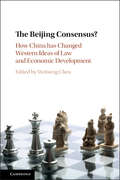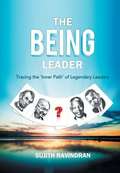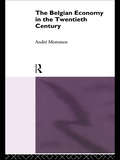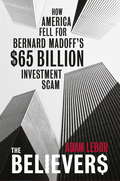- Table View
- List View
The Beautiful Generation: Asian Americans and the Cultural Economy of Fashion
by Thuy Linh Nguyen TuSince the 1990s, young Asian Americans including Doo-Ri Chung, Derek Lam, Thakoon Panichgul, Alexander Wang, and Jason Wu have emerged as leading fashion designers. They have won prestigious awards, been chosen to head major clothing labels, and had their designs featured in Vogue, Harper's Bazaar, and other fashion magazines. At the same time that these designers were rising to prominence, the fashion world was embracing Asian chic. During the 1990s, "Asian" shapes, fabrics, iconography, and colors filled couture runways and mass-market clothing racks. In The Beautiful Generation, Thuy Linh Nguyen Tu explores the role of Asian American designers in New York's fashion industry, paying particular attention to how they relate to the garment workers who produce their goods and to Asianness as a fashionable commodity. She draws on conversations with design students, fashion curators, and fashion publicists; interviews with nearly thirty Asian American designers who have their own labels; and time spent with those designers in their shops and studios, on their factory visits, and at their fashion shows. The Beautiful Generation links the rise of Asian American designers to historical patterns of immigration, racial formation, and globalized labor, and to familial and family-like connections between designers and garment workers.
The Beauty Brief: An Insider's Guide To Skincare
by Katie ServiceStylish and practical, this beauty expert’s guide to making informed skincare choices is a must-have for all beauty enthusiasts looking for safe, effective, and sustainably sourced products. Valued at over $550 billion, the global cosmetics market is experiencing an unprecedented boom worldwide, driven by the powerful influence of Instagram and YouTube’s new stars and renewed scrutiny when it comes to healthy and eco-friendly ingredients. With so many new products and procedures on the market, this timely guide by beauty expert Katie Service is designed to help readers choose the best products for their daily skincare. Opening with an accessible introduction that breaks down the big issues facing the beauty industry—from recyclables and vegan or cruelty-free products to “dupes” and toxic ingredients—Service goes on to reveal firsthand insider knowledge that every beauty enthusiast should know. Thematic chapters explore topics ranging from key ingredients, on-the-go products, morning and evening regimes, emergency skincare tips, and dermatological treatments, featuring case studies of global best-sellers Weleda Skin Food to Glossier Solution. Featuring specially commissioned illustrations, The Beauty Brief is a must-have reference for beauty enthusiasts, revealing which ingredients, products, and procedures to adopt or avoid for each skin type, age bracket, gender, and budget.
The Beauty Paradigm: Gender Discourse in Indian Advertising
by Jaishri JethwaneyFair skin sells the cream Trendy women sell the scooter Dashing men sell the car Seductive gestures can sell almost anything If media only mirrors reality, is advertising then guilty of misogyny, voyeurism and objectification of women? In an attempt to look at Indian ads across various brand categories with a gender lens based on societal and sociological perspectives, The Beauty Paradigm: Gender Discourse in Indian Advertising deconstructs the quintessential Indian woman that the advertising industry depicts across the spectrum. Drawing insights from a seminal research study and Erving Goffman’s classic book ‘Gender Advertisements’, this book traces the journey of a few decades to map trends and patterns in Indian advertising and presents the perspectives of the creative teams and top managements across Indian and global agencies.
The Beauty of Mathematics in Computer Science
by Jun WuThe Beauty of Mathematics in Computer Science explains the mathematical fundamentals of information technology products and services we use every day, from Google Web Search to GPS Navigation, and from speech recognition to CDMA mobile services. The book was published in Chinese in 2011 and has sold more than 600,000 copies. Readers were surprised to find that many daily-used IT technologies were so tightly tied to mathematical principles. For example, the automatic classification of news articles uses the cosine law taught in high school. The book covers many topics related to computer applications and applied mathematics including: Natural language processing Speech recognition and machine translation Statistical language modeling Quantitive measurement of information Graph theory and web crawler Pagerank for web search Matrix operation and document classification Mathematical background of big data Neural networks and Google’s deep learning Jun Wu was a staff research scientist in Google who invented Google’s Chinese, Japanese, and Korean Web Search Algorithms and was responsible for many Google machine learning projects. He wrote official blogs introducing Google technologies behind its products in very simple languages for Chinese Internet users from 2006-2010. The blogs had more than 2 million followers. Wu received PhD in computer science from Johns Hopkins University and has been working on speech recognition and natural language processing for more than 20 years. He was one of the earliest engineers of Google, managed many products of the company, and was awarded 19 US patents during his 10-year tenure there. Wu became a full-time VC investor and co-founded Amino Capital in Palo Alto in 2014 and is the author of eight books.
The Beauty of Success: Start, Grow, and Accelerate Your Brand
by Kendra Bracken-FergusonTap into your authentic self in work and life, unlock your career potential and embrace your freedom to choose If you have ever thought about becoming an entrepreneur—or if you are an “intrapreneur” climbing the corporate ladder—this book is for you. The Beauty of Success is an ultra-modern blueprint for navigating the path to starting, growing and accelerating your career while sowing the seeds of self-awareness and self-reflection. You’ll discover how author and 3x founder, Kendra Bracken-Ferguson aligned her personal pillars of community, mentorship, education, and capital with her business goals to bring her vision for building a successful company to fruition. Through her story, and the stories of other entrepreneurs in the beauty industry, she shares helpful nuggets of wisdom and collective experience that will help you pursue an entrepreneurial career or follow your path to the top of your corporate sector. The Beauty of Success is your guide to discovering your own guiding pillars, finding what ignites your passion, recognizing your strengths, and safeguarding what makes you valuable. Find inspiration in the story of Kendra Bracken-Ferguson’s entrepreneurial success and the candid stories of other prominent visionaries and leaders Identify the values and pillars that guide your life and your career, and find ways to align with them every day Reconnect with your inner purpose and your passion, whether you are starting your own business or climbing to the top of the corporate world Transcend any barriers to open yourself to new paths and levels of success The Beauty of Success will help you find your own professional north star—the principle or principles that will serve as your compass as you navigate your professional journey. You will also learn to appreciate the strengths that have gotten you this far, and how to leverage them to get where you want to be. Unlock your own success, find freedom, and carpe diem!.
The Beauty of the Beast: Breathing New Life Into Organizations
by Geoffrey M BellmanTHE WAYS WE GO about changing organizations usually don't work, asserts Geoff Bellman. Our underlying assumptions predetermine the results and preclude the broad success we so desperately seek. Change efforts often end up off-track because of small expectations. What is needed are grand expectations, so big that they cannot be realized in many lifetimes. It is only when people awaken to and work toward these immense purposes that they have the chance of finding fulfillment. Organizations are the perfect place to do this-these "beasts" which we create and curse, love and hate, that are so essential to our lives. In The Beauty of the Beast, Bellman shows how we can explore our huge potential and shift our daily organizational focus to one of long life and fulfillment-and in the process redesign our organizations for tomorrow. Bellman examines why we keep creating these creatures that fall so far short of our dreams for them. He reveals how to recognize the beast in ourselves, showing how organizational control and hierarchy multiply our natural and less constructive inclinations many times over. He points out that the problem is not the existence of organizations but in the ways we imagine them. Bellman asks us to consider what we want to pass on to future generations, helps us imagine the organizations we would be proud to create, and challenges us to take action from where we are today. He offers twenty renewal assertions to help us in redesigning organizations for tomorrow. These solid guides (with related questions for work groups) open the organization to new possibilities, helping us to embrace the organizational world as it really is while working hard to change it. In the process we will also change ourselves, as we ultimately feel less distant from-and more responsible for-creating those troubling structures we love to vent about. The Beauty of the Beast. will help people see their daily work in a new and larger perspective. It will help them embrace the real organizational world while they work at renewing it. And it will help people to recognize the choices available to them-and to exercise those choices for positive results.
The Bed of Procrustes: Philosophical and Practical Aphorisms (Incerto #4)
by Nassim Nicholas TalebBy the author of the modern classicThe Black Swan, this collection of aphorisms and meditations expresses his major ideas in ways you least expect. The Bed of Procrustestakes its title from Greek mythology: the story of a man who made his visitors fit his bed to perfection by either stretching them or cutting their limbs. It represents Taleb's view of modern civilization's hubristic side effects-modifying humans to satisfy technology, blaming reality for not fitting economic models, inventing diseases to sell drugs, defining intelligence as what can be tested in a classroom, and convincing people that employment is not slavery. Playful and irreverent, these aphorisms will surprise you by exposing self-delusions you have been living with but never recognized. With a rare combination of pointed wit and potent wisdom, Taleb plows through human illusions, contrasting the classical values of courage, elegance, and erudition against the modern diseases of nerdiness, philistinism, and phoniness.
The Beekeeper: Pollinating Your Organization for Transformative Growth
by Michael G. Frino Katie P. DesiderioPut yourself at the center of your team’s learning and growth In The Beekeeper, a team of renowned management and leadership professionals deliver an insightful and engaging exploration of what it means to place oneself at the core of learning and growth for the members of your organization. The story is told through the eyes of Catherine, the 43-year-old founder and owner of a rapidly growing business. You’ll follow her as she transforms the way she leads and inspires others, revolutionizing the culture at her company by learning from the people around her. The authors lead you through practical strategies and techniques you can implement immediately to achieve extraordinary results in your life and in your business. You’ll learn about: Taking a central and active role in the growth and maturation of your employees and leadership team members The author’s “Art of Learning to Be Proximal,” a strategy for placing yourself at the core of your company’s growth Methods for ensuring your team is putting people first and living your company’s mission and values An indispensable guide for founders, entrepreneurs, managers, and executives at growing companies, The Beekeeper will also earn a place on the bookshelves of company board members looking for ways to best contribute to their firm’s ongoing success.
The Beginner's Guide To Grant Writing: Tips, Tools, And Templates To Write Winning Grants
by Holly RustickThe Beginner's Guide to Grant Writing: Tips, Tools, & Templates to Write Winning Grants is your savior. It’s a proven step-by-step system to help you write competitive grants. Holly Rustick has secured millions and millions of dollars for organizations worldwide, and in this workbook, she shares her proven G.R.A.N.T.S. formula with you.
The Beginner's Guide to Cheesemaking: Easy Recipes and Lessons to Make Your Own Handcrafted Cheeses
by Elena R. SantogadeBeginners Become Experts—Cheese Making Made EasyThe Beginner's Guide to Cheese Making is an ideal introduction to making cheese at home. Filled with simple advice and straightforward recipes, this book makes it easy for you to start crafting your own scrumptious cheeses. No experience needed.Want to customize your cheeses? Discover the best ways to experiment with recipes and change up your creations. You'll also find suggestions for the best beer and wine pairings.The Beginner's Guide to Cheese Making includes:Complete Instructions—You'll know exactly what to do every step of the way thanks to thorough, illustrated guides geared towards new cheese makers.Step-by-Step Tracking—Write down your cheese making process on record sheets so you can easily remember or alter recipes on future attempts.Cheese is Only the Beginning—Learn how your homemade cheese can become the essential ingredient in savory snack, meal, and dessert recipes.Become the cheese master (who never has to settle for store-bought) with The Beginner's Guide to Cheese Making.
The Beginner's Guide to Real Estate Investing
by Gary W EldredStart making money today--with the ultimate guide for first-time investors No matter what the market does, real estate stilloffers plenty of money-making opportunities. In this new edition of The Beginner's Guide to Real Estate Investing, Gary W. Eldred presents the toolsand knowledge new investors need to get started profitably. Packed with smart money-making strategies and real-life stories from successful investors, this edition also covers the latest information on financing, foreclosures, cash flow, and much more. You'll not only master the basics of investing, but also discover specialized techniques that the pros rely on to grow their long-term wealth. Concise yet comprehensive, this practical guide shows you how to: Find great deals on properties with big potential Get started with low- or no-down payment financing Utilize creative financing options and otherpeople's money Buy low-cost foreclosures and REOs Make value-adding improvements to any property Craft winning offers and negotiate like a pro Manage rental properties hassle-free Flip investment properties for fast profit In addition, Eldred shows you how to tailor your investment strategy to make money almost anywhere, in any type of market. With proven techniques, timeless principles, and totally up-to-date information, The Beginner's Guide to Real Estate Investing, Second Edition is the perfect place to start building a prosperous future--today.
The Beginning of Heaven and Earth Has No Name: Seven Days with Second-Order Cybernetics (Meaning Systems)
by Heinz von FoersterHeinz von Foerster was the inventor of second-order cybernetics, which recognizes the investigator as part of the system he is investigating. The Beginning of Heaven and Earth Has No Name provides an accessible, nonmathematical, and comprehensive overview of von Foerster’s cybernetic ideas and of the philosophy latent within them. It distills concepts scattered across the lifework of this scientific polymath and influential interdisciplinarian. At the same time, as a book-length interview, it does justice to von Foerster’s élan as a speaker and improviser, his skill as a raconteur.Developed from a week-long conversation between the editors and von Foerster near the end of his life, this work playfully engages von Foerster in developing the difference his notion of second-order cybernetics makes for topics ranging from emergence, life, order, and thermodynamics to observation, recursion, cognition, perception, memory, and communication.The book gives an English-speaking audience a new ease of access to the rich thought and generous spirit of this remarkable and protean thinker.
The Beginnings of Accounting and Accounting Thought: Accounting Practice in the Middle East (8000 B.C to 2000 B.C.) and Accounting Thought in India (300 B.C. and the Middle Ages) (Routledge New Works in Accounting History)
by Richard MattessichBased on recent archaeological, historical and accounting research, this book presents a series of well-supported, but often surprising hypotheses on the 10,000 year-old history of accounting. Mattessich also illustrates the astounding sophistication manifested in some of the accounting and budgeting procedures throughout history. The second part of the book deals with the first manuscript containing sections describing accounting activities, the Kautilya's Arthasastra, written about 300 BC in India.
The Beginnings of Political Economy
by Jürgen Georg BackhausThis volume contains eleven essays on Johann Heinrich Gottlob von Justi's concepts of the modern economy. These essays reflect both Justi's life and professional work, focusing on his ideas on economics and social sciences. Interesting are the aspects of his biography that gave rise to the development of his economic thought. Apart from Justi's personal background, this book contains the beginning of modern economics because Justi's philosophy was linked to government, labour, morality, health and finally the good society. Justi, throughout his life, had a dual career of being on the one hand a prolific writer and educator, on the other hand an administrator in the core state business of mining, then an important revenue source, and he typically combined the two. He gave two inaugural lectures in 1750 in front of Queen and Empress Maria Theresia. The lecture on cameral sciences is truly the beginning of modern economics: Justi was of the opinion that the happiness of the state would be increased if the number of happy and healthy persons would increase. For this reason, health was a major focus of his attention long before the advent of health economics. The main benefit the reader will derive from the book is an understanding of how economics developed as a separate science. Furthermore, they will see how Justi laid the foundation for policy sciences, the specialty of many schools of governement today.
The Behavior Gap: Simple Ways to Stop Doing Dumb Things with Money
by Carl Richards"It's not that we're dumb. We're wired to avoid pain and pursue pleasure and security. It feels right to sell when everyone around us is scared and buy when everyone feels great. It may feel right-but it's not rational. " -From The Behavior Gap Why do we lose money? It's easy to blame the economy or the financial markets-but the real trouble lies in the decisions we make. As a financial planner, Carl Richards grew frustrated watching people he cared about make the same mistakes over and over. They were letting emotion get in the way of smart financial decisions. He named this phenomenon-the distance between what we should do and what we actually do-"the behavior gap. " Using simple drawings to explain the gap, he found that once people understood it, they started doing much better. Richards's way with words and images has attracted a loyal following to his blog posts for The New York Times, appearances on National Public Radio, and his columns and lectures. His book will teach you how to rethink all kinds of situations where your perfectly natural instincts (for safety or success) can cost you money and peace of mind. He'll help you to: avoid the tendency to buy high and sell low; avoid the pitfalls of generic financial advice; invest all of your assets-time and energy as well as savings-more wisely; quit spending money and time on things that don't matter; identify your real financial goals; start meaningful conversations about money; simplify your financial life; stop losing money! It's never too late to make a fresh financial start. As Richards writes: "We've all made mistakes, but now it's time to give yourself permission to review those mistakes, identify your personal behavior gaps, and make a plan to avoid them in the future. The goal isn't to make the 'perfect' decision about money every time, but to do the best we can and move forward. Most of the time, that's enough. "
The Behavior of Non-Oil Commodity Prices
by Carmen M. Reinhart Mohsin S. Khan Peter Wickham Eduardo BorenszteinThis paper analyzes global commodity trends and concludes that the marked decline in real commodity prices of the past decade should be regarded as largely permanent and irreversible. the authors contend that the analysis of commodity prices should be extended to include the role of the breakdown of major international commodity agreements. In addition, the authors analyze how developments in the former Soviet Union have affected commodity supply conditions.
The Behavioral Advantage: What the Smartest, Most Successful Companies Do Differently to Win in the B2B Arena
by David Pugh Terry BaconIn their book Winning Behavior, Terry Bacon and David Pugh showed how great companies outperform good ones through "behavioral differentiation" -- going beyond superior products and dependable service to connect with customers at every touchpoint. The Behavioral Advantage broadens the concept, applying behavioral differentiation to the business-to-business arena.The best B2B companies depend on a multifront approach to business interaction, and The Behavioral Advantage reveals the secrets behind what is essentially a chess game with competitors. To win the game, companies must develop a carefully plotted opening game, with all internal values, policies, practices, and behaviors fully aligned. A smart and efficient middle game lets the company build and strengthen its position, and the endgame assures victory and lays the groundwork for future business.Just as individual customers do, B2B customers remember those companies whose behavior consistently and significantly outshines even strong competitors. These firms create a lasting advantage -- and reap the profits that come with it.
The Behavioral Economics of Inflation Expectations: Macroeconomics Meets Psychology
by Tobias F. RötheliAs one of the first texts to take a behavioral approach to macroeconomic expectations, this book introduces a new way of doing economics. Rötheli uses cognitive psychology in a bottom-up method of modeling macroeconomic expectations. His research is based on laboratory experiments and historical data, which he extends to real-world situations. Pattern extrapolation is shown to be the key to understanding expectations of inflation and income. The quantitative model of expectations is used to analyze the course of inflation and nominal interest rates in a range of countries and historical periods. The model of expected income is applied to the analysis of business cycle phenomena such as the great recession in the United States. Data and spreadsheets are provided for readers to do their own computations of macroeconomic expectations. This book offers new perspectives in many areas of macro and financial economics.
The Behaviourally Informed Organization (Behaviourally Informed Organizations)
by Cass R. Sunstein Dilip Soman and Catherine Yeung, eds.Every organization is fundamentally in the business of behavior change. Whether it be a government trying to get business to comply with environmental regulation, a business trying to get its customers to be loyal to their products, or a financial advisor encouraging a client to start saving for retirement, behavior change is critical to organizational success. Despite its centrality to organizations, we do not have a good scientific framework for behavior change or a good understanding of how organizations can embed insights from behavioral science into their operations. To overcome this void, this book develops an overarching framework for using behavioral science. It shows how behavioral insights (BI) can be embedded in organizations to achieve better outcomes, improve the efficiency of processes, and maximize stakeholder engagement. This edited volume will provide an enterprise-wide strategic perspective of how governments, businesses, and other organizations have embedded BI into their operations. It is based on research by academics and practitioners from the Behaviourally Informed Organizations Partnership and will highlight ideas, pragmatic frameworks, and prescriptive outcomes, based on illustrative case studies. Featuring a foreword by Cass Sunstein, this book investigates key findings from BI, with an eye toward how it can be used to solve problems and seize opportunities in diverse organizations.
The Beijing Consensus
by Stefan HalperBeijing presents a clear and gathering threat to Washington-but not for the reasons you think. China’s challenge to the West stems from its transformative brand of capitalism and an entirely different conception of the international community. Taking us on a whirlwind tour of China in the world-from dictators in Africa to oligarchs in Southeast Asia to South American strongmen-Halper demonstrates that China’s illiberal vision is rapidly replacing that of the so-called Washington Consensus. Instead of promoting democracy through economic aid, as does the West, China offers no-strings-attached gifts and loans, a policy designed to build a new Beijing Consensus. The autonomy China offers, together with the appeal of its illiberal capitalism, have become the dual engines for the diffusion of power away from the West. The Beijing Consensusis the one book to read to understand this new Great Game in all its complexity.
The Beijing Consensus: Legitimizing Authoritarianism in Our Time
by Stefan HalperBeijing presents a clear and gathering threat to Washington-but not for the reasons you think. China’s challenge to the West stems from its transformative brand of capitalism and an entirely different conception of the international community. Taking us on a whirlwind tour of China in the world-from dictators in Africa to oligarchs in Southeast Asia to South American strongmen-Halper demonstrates that China’s illiberal vision is rapidly replacing that of the so-called Washington Consensus. Instead of promoting democracy through economic aid, as does the West, China offers no-strings-attached gifts and loans, a policy designed to build a new Beijing Consensus. The autonomy China offers, together with the appeal of its illiberal capitalism, have become the dual engines for the diffusion of power away from the West. The Beijing Consensus is the one book to read to understand this new Great Game in all its complexity.
The Beijing Consensus?
by Weitseng ChenIs there a distinctive Chinese model for law and economic development? In The Beijing Consensus scholars turn their collective attention to answer this basic but seemingly under-explored question as China rises higher in its global standing. Advancing debates on alternative development programs, with a particular focus on social and political contexts, this book demonstrates that essentially, no model exists. Engaging in comparative studies, the contributors create a new set of benchmarks to evaluate the conventional wisdom that the Beijing Consensus challenges and that of the Beijing Consensus itself. Has China demonstrated that the best model is in fact no model at all? Overall, this title equips the reader with an understanding of the conclusions derived from China's experience in its legal and economic development in recent decades.
The Being Leader: Tracing the 'Inner Path' of Legendary Leaders, First Edition
by Sujith RavindranFollowing the modus operandi of renowned business leaders of the time, Sujith Ravindran grew into various leadership positions within corporations and start-ups across the globe. After a decade and a half of successes, he sunk into a spiritual crisis in his life. That void led him to leave his corporate life in pursuit of self-realization. On a quest to find the qualities that made leaders legendary, there he came across the inner path of the four legendary leaders portrayed in this book; Dr. Martin Luther King, Nelson Mandela, M. K. Gandhi and Abraham Lincoln. From the lives of these 'Being Leaders' Sujith discovered that it was not a set of skills or capabilities that made leaders legendary, instead it was a certain 'inner state' that made them so. This book examines that 'inner state' and traces the path that got the Being Leaders to that state. The Being Leaders go beyond the 'Doing' to master the realm of true 'Being'. This realm is one of great personal mastery and self-authorship, a very high level of self-awareness and a life expressing their highest ideals each day. This book is for those who long to embody the highest level of leadership in the organizational or societal realm.
The Belgian Economy in the Twentieth Century (Contemporary Economic History Of Europe Ser.)
by Andre MommenBy the end of the nineteenth century Belgium was enjoying considerable economic success. However, the economic experience has proved significantly less stable in the twentieth century. In The Belgian Economy in the Twentieth Century Professor Andre Mommen describes and analyzes the changing fortunes of the Belgian economy throughout this century. H
The Believers: How America Fell For Bernard Madoff's $65 Billion Investment Scam
by Adam LeBorHow America fell for financier Bernie Madoff's $65 billion investment scam.It was luxurious Palm Beach, by the manicured lawns and Olympic-sized swimming pool, that financier Bernard Madoff ravaged the world of philanthropy and high society he had strived so hard to join, vaporising the assets of charities, foundations and individuals that had trusted him with their funds. It seems nothing was sacrosanct to Madoff, possibly the greatest con-man in history. Even Elie Wiesel's foundation has lost tens of millions. How could Madoff, a pillar of the Jewish community, do this to a Nobel Laureate and Auschwitz survivor? But Wiesel was hardly alone in trusting the rogue financier. How could some of the most sophisticated and worldly people in America fall victim to a collective delusion for year after year? THE BELIEVERS answers these unsettling questions. It opens up the clubbish world where Madoff operated, tracing the links from Palm Beach and The Hamptons to the salons and clubs of Manhattan society. It details the network of relationships across which flows hundreds of millions of dollars. 'The Believers' shows how despite material success and acclaim, some human impulses remain eternal. It reveals how an underlying sense of insecurity still shapes some of the richest and most successful individuals in America, making them crave ever more status and peer acclaim. By focusing on Madoff's connection to, and catastrophic impact on, the American Jewish community, THE BELIEVERS dramatically humanises a story that is part financial scandal and part Greek tragedy.
